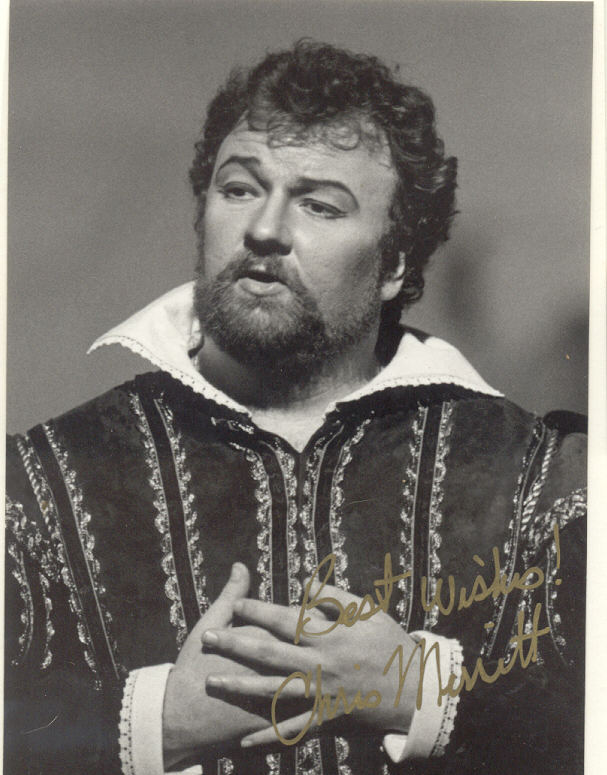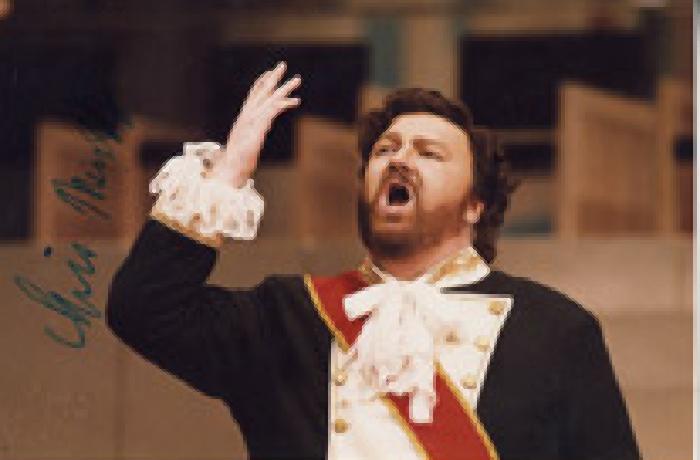Chris Merritt
born 27 September 1952 Oklahoma City
Click for recollections on Chris Merritt between La donna
del lago in Paris (1986) and Guillaume Tell in London (1990), his poor showing in Sigurd (1994) and his fiasco in San
Francisco in November 1997.
Merritt studied piano, singing, dance and drama at Oklahoma City University, where he made his first stage appearance
in Les contes d'Hoffmann in a university production. At age 21, he was accepted into the summer season Apprentice Program for
Singers at the Santa Fe Opera.
His high, lyrical tenor voice made him well-suited to the bel canto roles, such as those by Rossini.
He made his official debut in 1975, as Cajus in Falstaff. Auditions at the Metropolitan Opera won him a part in I puritani
in 1981 at the City Opera, and that was the performance which brought him international attention and marked the beginning of
a very successful career.
His Met debut took place on 30 November 1990, when he sang the role of Idreno in Rossini's Semiramide, which was not very
successful, however. He much improved the next year when he sang there the role of Arturo in I puritani along with Edita
Gruberová. Successively he performed at the Met also in principal roles in Rusalka (in 1997, he was booed), and
Kaťa Kabanová (in 2005).
In other places, he made his debut at Covent Garden in La donna del lago on 27 June 1985, and sang there also the role of
Arnold in Guillaume Tell (in 1990) where he was heavily booed and fights broke out in the auditorium during his
curtain call.
At the San Francisco Opera, he sang in Maometto II (debut in 1988), and also the role of Arnold in Guillaume Tell in
1992 and in the 1997/98 season. On 6 August 1993, he sang the title role in Sigurd completely overparted
at the sole performance of that rarely performed opera at the Festival Montpellier.
In 2006, Merritt appeared in the American premiere production of Thomas Adès' The tempest at the Santa Fe Opera.
Reference
Merritt is the perfect example of a belcanto tenor killing his voice singing Arnold. When his voice was finished, he turned to singing
modern operas. But he also dared to sing Éléazar in Paris and was taken apart by the audience.
Avrebbe fatto meglio a stare a
casa. |
In RA format
In RA format
On the interesting Merritt recollections page, Roberto Marcocci mentions a
concert in Modena where Merritt was excellent, and a Zelmira at La Fenice after that concert. He says he believes the concert was
in 1983/84, but is not sure.
Well, the Zelmira was actually on July 19th, 1988, and I have a complete Merritt concert from
Modena October 5th, 1987, where he does some great singing indeed (never released on records, never broadcast!) ... could very well be
the concert Marcocci was referring to.
The next nine recordings were part of one concert and sung in that order.
He already sings arias too heavy for him (Tell, but above all Troyens).
Nevertheless, some great singing, too – the Anna Bolena, the Tancredi, the Pour mon âme,
the A te o cara.
In RA format
In RA format
In RA format
In RA format
In RA format
| Chris Merritt sings | Anna Bolena: Vivi tu
|
In RA format
In RA format
In RA format
In RA format
In RA format
In RA format
In RA format
I would like to thank Thomas Silverbörg for the recording (Guillaume Tell duet).
I would like to thank Helmut Krautschneider for the recordings (Zelmira, Puritani duet, Bianca e Falliero).
|

